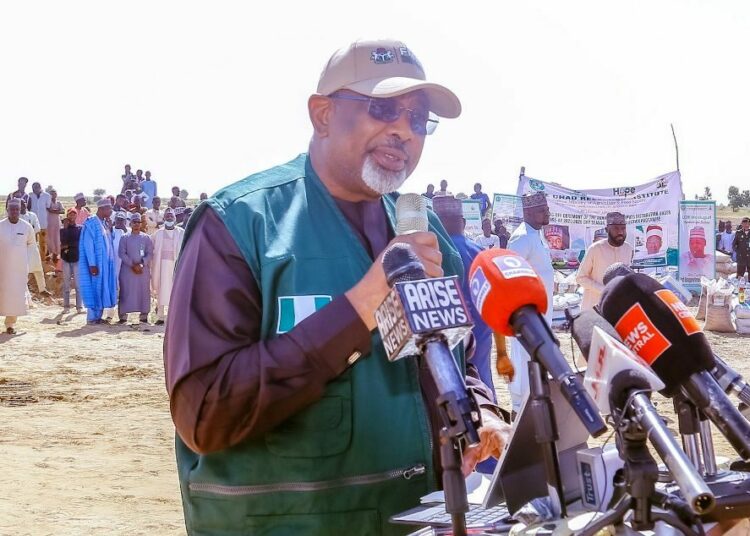The federal government has set a target earning of N160 billion in output value from wheat cultivation in the 2025/2026 dry season.
As part of efforts to strengthen food sovereignty and curb reliance on imports, the minister of agriculture and food security, Abubakar Kyari, announced the plan at the launch of the subsidised inputs distribution for the new wheat season planting in Jere, Borno State.
Kyari said the programme which is under the National Agricultural Growth and Agro Pocket Project (NAGS-AP) has designated 40,000 hectares for cultivation and registered 80,000 farmers across the country.
According to a statement issued by the ministry’s head of Information Department, Ezeaja Ikemefuna, the minister added that Borno State alone has been allocated 3,000 hectares and 6,000 participating farmers.
He noted earlier achievements under the initiative, saying the 2023/2024 and 2024/2025 dry-season schemes supported a combined 386,726 registered farmers with subsidised inputs.
He said the current cycle would be backed by extension agents providing field-level advisory services, alongside fertiliser and seed quality control officers to ensure that only certified inputs reach farmers.
Under the 2025 – 2026 wheat farming, 16 states are participating in the wheat programme, with Cross River included to expand production into the southern region for the first time.
Kyari added that the project is structured to accommodate women and young people and emphasised the need for certified seeds, accurate fertiliser blends, and timely access to crop protection products.
He said, “NAGS- AP is deliberately designed to leave no one behind. The programme ensures that farmers across communities, including women and young people, who play vital roles in our agricultural workforce, have equitable access to inputs, training, and opportunities.
“The success of any agricultural season depends on the quality of inputs that reach our farmers. Without certified seeds, accurate fertiliser blends, and timely access to crop protection products, no level of effort in the field can deliver the yields we require as a nation.
“This is why NAGS- AP places strong emphasis on input quality, traceability, and transparent delivery systems, ensuring that every farmer receives the right inputs at the right time to achieve higher productivity and better returns,” he said.
Borno State governor, Babagana Zulum, welcomed the intervention and commended the federal government’s continued support for irrigation development.
He said the state’s vast arable and irrigable land, particularly around the Lake Chad Basin, positions it as one of the country’s most promising agricultural zones.
Zulum reaffirmed his administration’s commitment to all-season farming, highlighting recent gains in supporting smallholders, resettled households, women, and youth with improved inputs and training.





